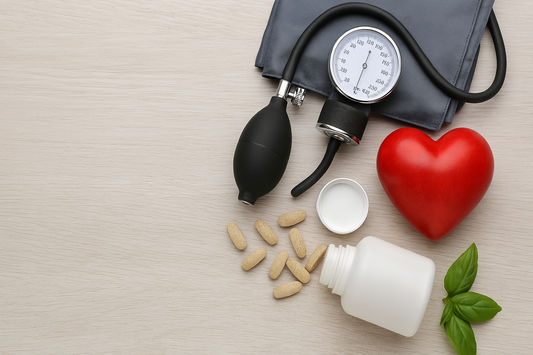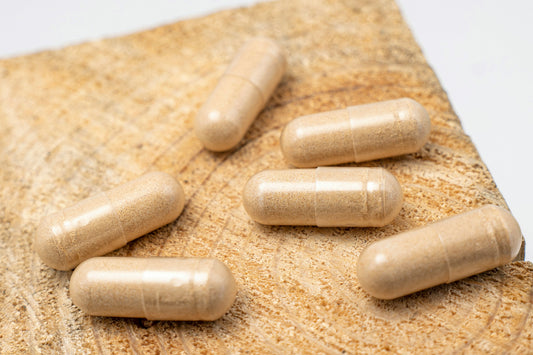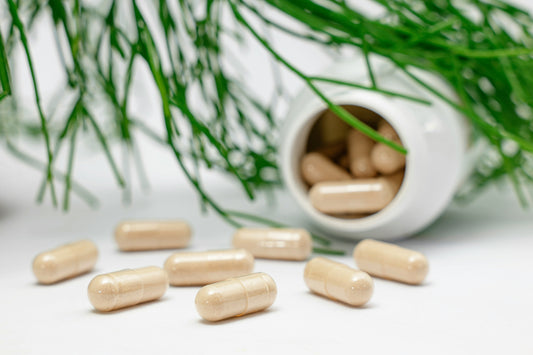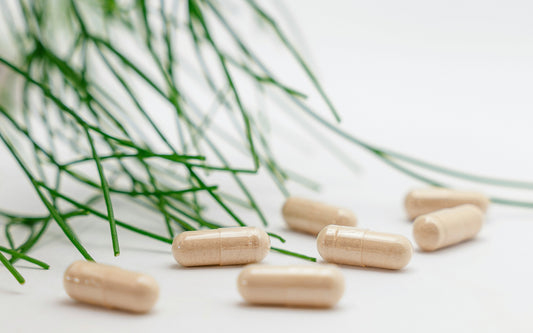Does Garlic Lower Blood Pressure? Exploring the Evidence
Garlic has been used for centuries as a natural remedy for various ailments, including high blood pressure. But does garlic actually lower blood pressure, or is it just a myth? In this section, we will examine the scientific evidence regarding garlic's impact on blood pressure levels.
Several studies have explored the potential benefits of garlic for cardiovascular health, including its ability to lower blood pressure. Some research suggests that consuming garlic may have a modest effect on reducing blood pressure levels.
Garlic contains a variety of compounds that are thought to contribute to its potential health benefits, including allicin, which has been shown to have antioxidant and anti-inflammatory properties. Additionally, garlic is a good source of vitamin C, vitamin B6, and manganese, which are all important nutrients for overall health.
Despite the promising evidence, it is important to note that garlic should not be used as a standalone treatment for high blood pressure. It should be used as part of a comprehensive approach to managing hypertension, which may include lifestyle changes, such as exercise and a healthy diet, as well as medication prescribed by a healthcare professional.
Key Takeaways:
- Garlic may have a modest effect on reducing blood pressure levels
- Garlic contains compounds such as allicin, which have potential health benefits
- Garlic should not be used as a standalone treatment for high blood pressure
- A comprehensive approach to managing hypertension is recommended
- Consult with a healthcare professional before starting any new supplement or treatment for high blood pressure
Garlic and its Potential to Lower Blood Pressure

Garlic has been touted as a natural remedy for high blood pressure, but what is it about this pungent herb that may have potential benefits for cardiovascular health?
One of the active compounds found in garlic is allicin, which has been suggested to have a positive impact on blood pressure levels. Allicin is released when garlic is crushed or chopped, and it has been shown to have vasodilatory effects, which means that it can relax and widen blood vessels. This in turn may lead to improved blood flow and lower blood pressure.
Garlic supplements are a popular option for those seeking to reap the potential benefits of allicin. These supplements are available in various forms, including capsules, tablets, powders, and oils. However, it is important to note that the amount of allicin and other active compounds in garlic supplements can vary widely, and some supplements may not contain the levels of allicin necessary to have a significant impact on blood pressure.
| Garlic and Cardiovascular Health |
|---|
| Garlic has been suggested to have additional health benefits beyond its potential impact on blood pressure. Some studies have shown that regular consumption of garlic may be associated with a reduced risk of cardiovascular disease. |
Overall, the potential of garlic to lower blood pressure may be attributed to its ability to increase the production of nitric oxide. Nitric oxide is a molecule that plays a crucial role in regulating blood pressure by relaxing blood vessels and improving blood flow. Garlic has been shown to stimulate the production of nitric oxide, which may contribute to its potential benefits for cardiovascular health.
While garlic may hold promise as a natural remedy for high blood pressure, more research is needed to fully understand its effectiveness and the optimal dosage for achieving benefits. It is also important to note that garlic supplements should not be used as a substitute for prescribed medications without consulting a healthcare professional.
The Relationship Between Garlic and Nitric Oxide
Garlic has been found to have potential benefits for vascular health, including its ability to improve blood flow and blood pressure regulation. This is due in part to its impact on nitric oxide production in the body.
Nitric oxide is a molecule that plays a crucial role in regulating blood pressure by dilating blood vessels and increasing blood flow. Garlic has been shown to stimulate the production of nitric oxide in the endothelial cells that line the blood vessels, which can help to improve vascular health and decrease the risk of hypertension.
In addition to its effects on nitric oxide production, garlic also contains compounds that have antioxidant and anti-inflammatory properties. These properties may help to protect the endothelial cells from oxidative stress and inflammation, which can contribute to the development of cardiovascular disease.
Overall, the relationship between garlic and nitric oxide suggests that incorporating garlic into a healthy diet may have positive effects on vascular health and blood pressure regulation. However, more research is needed to fully understand the mechanisms by which garlic exerts its effects and the optimal dosage for achieving benefits.
Scientific Studies on Garlic's Effects on Blood Pressure

Several scientific studies have investigated the potential benefits of garlic supplementation for individuals with hypertension. A meta-analysis of 11 randomized, double-blind, placebo-controlled trials found that garlic significantly lowered both systolic and diastolic blood pressure in individuals with hypertension compared to placebo.
Another study conducted in Australia found that a garlic supplement containing 240 mg of allicin significantly lowered blood pressure in individuals with uncontrolled hypertension. However, in this study, the blood pressure-lowering effect was only observed in those with higher initial blood pressure levels.
Interestingly, some studies have shown that aged garlic extract may have a greater impact on blood pressure than raw garlic. In a randomized, double-blind, placebo-controlled trial, aged garlic extract significantly reduced systolic blood pressure in individuals with uncontrolled hypertension after 12 weeks of supplementation.
However, it is important to note that some studies have produced conflicting results. For example, a meta-analysis of 17 randomized, double-blind, placebo-controlled trials found that garlic supplementation did not significantly lower blood pressure compared to placebo. More research is needed to fully understand the potential benefits of garlic for blood pressure regulation.
Garlic and Hypertension: The Bottom Line
While there is some evidence to suggest that garlic may have a positive impact on blood pressure, more research is needed to fully understand its effectiveness and the optimal dosage for achieving benefits. It is important to consult with a healthcare professional before starting any new supplement, such as Nutrigrove Blood Pressure Support, to ensure it is appropriate for your individual health needs.
Conclusion
In conclusion, while there is some evidence to suggest that garlic may have a positive impact on blood pressure, more research is needed to fully understand its effectiveness and the optimal dosage for achieving benefits. It is important to consult with a healthcare professional before starting any new supplement.
If you are interested in trying a natural approach to managing your blood pressure, Nutrigrove Blood Pressure Support can be a helpful supplement to consider. This supplement is formulated with a blend of natural ingredients, including garlic, that has been shown to support healthy blood pressure levels.
Consult with Your Healthcare Provider
Before adding any new supplement to your routine, it is important to consult with your healthcare provider to ensure it is appropriate for your individual health needs. Nutrigrove Blood Pressure Support is not intended to diagnose, treat, cure, or prevent any disease, and should not be used as a replacement for medical advice or treatment.
Additional Heart Healthy Resources:
- What Should I Do If My Blood Pressure Is Over 160 Over 100
- Does Olive Leaf Lower Blood Pressure?
- Can You Reverse High Blood Pressure?
- What Brings Down Blood Pressure Naturally?
- How Long Should I Water Fast to Lower Blood Pressure?
- What Brings Down Blood Pressure Naturally?
- Can Lack of Sleep Cause High Blood Pressure?
- What are the 5 warning signs for stroke?
- What blood pressure is too high?
- Natural Guide for Effective Blood Pressure Support
- Does Hibiscus Flower Lower Blood Pressure?
Overall, incorporating healthy lifestyle habits such as regular exercise, a balanced diet, and stress management techniques can also contribute to improved blood pressure levels. By working with your healthcare provider and adopting a holistic approach to your health, you can support your cardiovascular health and overall well-being.
FAQ
Does Garlic Lower Blood Pressure?
Garlic has been found to have potential benefits for lowering blood pressure. Numerous scientific studies have explored garlic's effects on blood pressure levels and have shown promising results.
What is the potential of garlic to lower blood pressure?
Garlic contains a compound called allicin, which has been suggested to contribute to its potential to lower blood pressure. Allicin may help relax blood vessels and promote better blood flow, resulting in reduced blood pressure levels.
How does garlic affect nitric oxide levels?
Garlic has been found to stimulate the production of nitric oxide in the body. Nitric oxide helps relax and dilate blood vessels, leading to improved cardiovascular health and blood pressure regulation.
What do scientific studies say about garlic's effects on blood pressure?
Several scientific studies have investigated the effects of garlic on blood pressure in individuals with hypertension. These studies have shown that garlic may have a modest, beneficial impact on reducing blood pressure levels. However, further research is needed to fully understand its effectiveness and optimal dosage.
Is garlic recommended as a primary treatment for high blood pressure?
While garlic may have potential benefits for blood pressure management, it is important to note that it should not be considered a primary treatment for hypertension. It can be used as a complementary approach alongside lifestyle changes and prescribed medications. Consulting with a healthcare professional is recommended to determine the best treatment plan.






